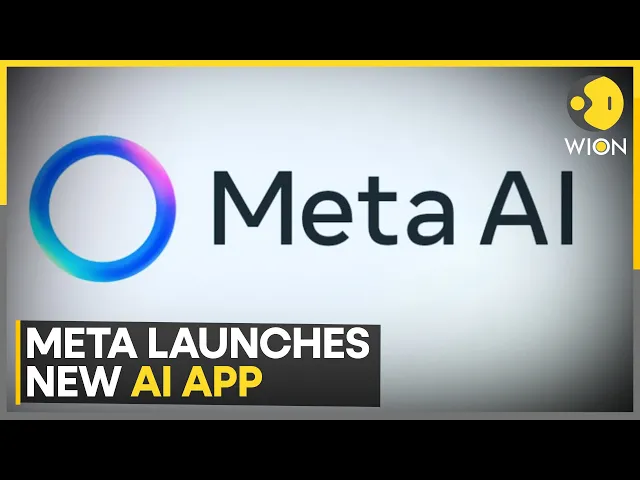Meta Introduces New AI App, Meta AI, To Rival Chatgpt | World News

Meta AI leads fresh approach to voice assistants
In a bold move that signals its commitment to artificial intelligence, Meta Platforms has unveiled a standalone AI application designed to challenge OpenAI's ChatGPT dominance. The announcement, made at Meta's first AI developer conference in California, introduces not just a new consumer-facing AI assistant but also a developer API that makes the company's powerful Llama model accessible with "one line of code" — potentially reshaping how businesses integrate AI into their workflows.
Key developments from Meta's announcement:
-
Meta is launching both a consumer AI app and developer API based on its new Llama 4 model, positioning itself as a direct competitor to offerings from OpenAI, Google, and emerging players like China's Deep Seek.
-
Unlike competitors, Meta has made its AI technology free and open-source, potentially lowering the barrier to entry for businesses looking to implement AI solutions.
-
The new Meta AI assistant emphasizes voice interaction with "low latency, highly expressive voice" capabilities, allowing for more natural conversations than current text-based interfaces.
-
The assistant can be connected to users' Facebook and Instagram accounts, enabling personalization based on social media activity and remembered preferences—like family members' names or important dates.
-
According to Reuters, Meta is exploring a paid subscription model for its AI chatbot, suggesting a potential business strategy shift despite the current free offering.
Why Meta's approach matters
The most compelling aspect of Meta's announcement is their focus on voice interaction as the primary interface. While companies like OpenAI and Anthropic have dominated AI headlines with powerful text-based systems, Meta appears to be betting that the future of AI assistants lies in conversation that feels more human and requires less typing.
This strategic direction makes sense given broader industry trends. Voice search now accounts for roughly 20% of mobile queries, and smart speaker adoption continues to grow worldwide. By prioritizing what Meta CEO Mark Zuckerberg called "the most natural possible interface," Meta is positioning itself ahead of an inevitable shift in how people will want to interact with AI systems as they become more capable.
The personalization angle is equally important. By leveraging data from its massive social platforms, Meta can potentially deliver more contextually relevant responses than competitors who lack similar insights into users' preferences and interests. For businesses, this points to a future where AI
Recent Videos
How To Earn MONEY With Images (No Bullsh*t)
Smart earnings from your image collection In today's digital economy, passive income streams have become increasingly accessible to creators with various skill sets. A recent YouTube video cuts through the hype to explore legitimate ways photographers, designers, and even casual smartphone users can monetize their image collections. The strategies outlined don't rely on unrealistic promises or complicated schemes—instead, they focus on established marketplaces with proven revenue potential for image creators. Key Points Stock photography platforms like Shutterstock, Adobe Stock, and Getty Images remain viable income sources when you understand their specific requirements and optimize your submissions accordingly. Specialized marketplaces focusing...
Oct 3, 2025New SHAPE SHIFTING AI Robot Is Freaking People Out
Liquid robots will change everything In the quiet labs of Carnegie Mellon University, scientists have created something that feels plucked from science fiction—a magnetic slime robot that can transform between liquid and solid states, slipping through tight spaces before reassembling on the other side. This technology, showcased in a recent YouTube video, represents a significant leap beyond traditional robotics into a realm where machines mimic not just animal movements, but their fundamental physical properties. While the internet might be buzzing with dystopian concerns about "shape-shifting terminators," the reality offers far more promising applications that could revolutionize medicine, rescue operations, and...
Oct 3, 2025How To Do Homeless AI Tiktok Trend (Tiktok Homeless AI Tutorial)
AI homeless trend raises ethical concerns In an era where social media trends evolve faster than we can comprehend them, TikTok's "homeless AI" trend has sparked both creative engagement and serious ethical questions. The trend, which involves using AI to transform ordinary photos into images depicting homelessness, has rapidly gained traction across the platform, with creators eagerly jumping on board to showcase their digital transformations. While the technical process is relatively straightforward, the implications of digitally "becoming homeless" for entertainment deserve careful consideration. The video tutorial provides a step-by-step guide on creating these AI-generated images, explaining how users can transform...
